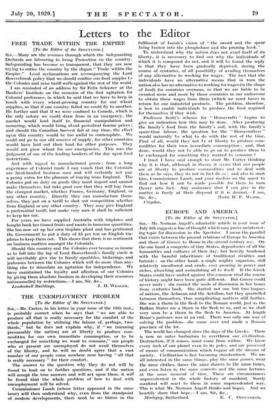EUROPE AND AMERICA
[To the Editor of the SPECTATOR.] SIR,—Mr. Norman Angell's admirable article in your issue of July 6th suggests a line of thought which may prove an interest- ing topic for discussion in the Spectator. I mean the parallel that exists between the present relations of Europe to America and those of Greece to Rome in the second century B.C. On the one hand a congeries of tiny States, depositories of all the humanities and cultures of their day, but heavily burdened with the baneful inheritance of traditional rivalries and hatreds ; on the other hand, a single mighty organism, still relatively uncultured and crude, ever growing in power and riches, absorbing and assimilating all to itself. If the Greek States could have united against this common rival the course of history might have been quite different. But Greece could never unite ; she carried the seeds of dissension in her bones from centuries back. She started not one but two leagues of nations, the Achaean and the Aetolian, but they quarrelled between themselves, thus complicating matters still further. She was a thorn in the flesh to the Roman world, just as the Balkan States are a thorn in the flesh to us, and as we shall very soon be a thorn in the flesh to America. At length Rome's patience was at an end. There was only one way of solving the problem—she came over and made a Roman province of the lot.
The world has changed since the days of the Greeks. There is now no outer barbarism to overthrow our civilization. Destruction, if it comes, must come from within. We know every inch of our planet even to its poles, and are possessed of means of communication which beggar all the dreams of society. Civilization is fast becoming standardized. We are all interested in the same things, play the same games, wear the same clothes, dance the same dances to the same tunes, and even listen to the same concerts awl the same lectures at the same moment of time. These are circumstances unprecedented in the whole history of mankind. Surely mankind will react to them in some unprecedented way. This is what Mr. Norman Angell thinks and hopes. And we heartily share that hope.—I am, Sir, &c., -
















































 Previous page
Previous page